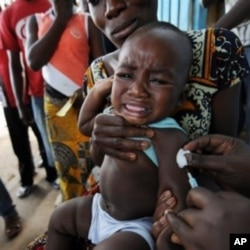Sierra Leone has launched a week-long campaign to immunize its entire population against yellow fever after cases were recorded last year in two districts. The effort is part of a program to immunize people in three West African countries, including Liberia and Benin.
One year-old Abdulay Kuyatay is not impressed with the pinch of his yellow fever shot at a Red Cross vaccination post in downtown Freetown.
Kuyatay is one of more than four million Sierra Leoneans targeted for a free ten-year vaccine against the disease this week.
Amara Jambai is director of disease prevention and control at the Sierra Leone Ministry of Health. He says the campaign is the first of its kind.
"Sierra Leone is one of the countries with the highest risk, Liberia and then Benin. So we are doing this campaign so as to minimize the risk of having a full-blown outbreak of yellow fever," Jambai said.
Jambai says after cases of yellow fever showed up in November 2008 in the forested Southern regions of Bo and Kenema, the government acted quickly to protect the entire population.
Yellow fever is a viral disease affecting the liver and kidneys, causing high fever and a yellowing of the skin and eyes. It is transmitted by infected mosquitoes and is endemic to many West African countries. More than 200,000 people die of yellow fever every year. Although there is no cure, the vaccine is relatively cheap and highly effective.
Jambai says it was difficult to get hold of so many vaccines so quickly.
"The initial campaign was in five districts in May and this is the second part of that campaign now, because the population we are targeting were so many. Now, during this present campaign, we are targeting about 2.4-million people, including the Western Urban - and you can imagine what it is like in this capital, Freetown, bursting with a lot of activities," Jambai said.
Haja Kutulmi Karim is health coordinator at Sierra Leone's Red Cross Society, which is assisting the government with the campaign. She says it is an enormous task to make sure everyone comes to get their vaccination.
"We were able to train 300 volunteers who are doing house-to-house visits to mobilize people and tell them about the vaccine and its importance," said Karim.
On the streets of Freetown, people carry square yellow cards proving their immunization. Radio spots and posters encourage everyone, except pregnant women and children under nine months, to go to their nearest vaccination post.
Dr. Jambai hopes to achieve complete coverage.
"The vaccine gives protection for about ten years. So, if we are able to get a high proportion of the people vaccinated -- let us say 95 percent and above -- then it gives you some sort of immunity of the general population," Jambai said.
In an attempt to control the spread of the disease, travelers to Sierra Leone must show proof of yellow fever immunization at the border. Jambai says it is difficult to eradicate yellow fever completely, but mass vaccination is a step in the right direction.
At the downtown Red Cross post, little Abdulay Kuyatay gets a bonus measles shot in his other arm. His mother, Yabom Turay, rubs his shoulder.
Turay says she will do anything to help prevent her young son from getting sick.





